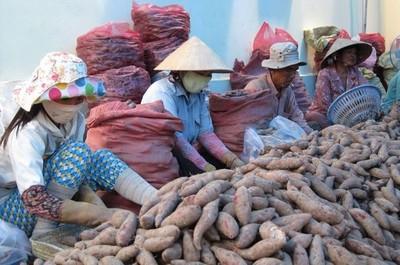
Feeling the vibrancy of ‘sweet potato economy’ in Yiwu
Li Zhiqi
Standing in the corridor of the Yiwu International Trade Market, one can see Arab merchants bargaining with vendors in fluent Chinese, African buyers livestreaming new electronic accessories, and European clients verifying contracts through AI translation systems. As the world’s largest wholesale market for small commodities, Yiwu achieved a transaction volume of 279.803 billion yuan ($38.90 billion) in 2024, with an average daily foot traffic of 224,300 people, including over 3,900 foreign buyers per day. It has become a prime window for observing the resilience of China’s private economy and the ingenuity of economic globalization.
The glass curtain walls of Yiwu Airport reflect the evolving landscape of global trade. A decade ago, it was mainly a feeder airport for domestic flights. Today, 20 cargo planes depart weekly to destinations like Manila and Osaka. With an annual throughput surpassing three million passengers, this airport functions as an “aerial shelf” for the Yiwu market. Behind this lies Yiwu’s 30-year methodology for participating in globalization.
In response to US tariffs, Yiwu has developed three main counter-strategies: first, it has extended its market “vines” by leveraging procurement networks across Belt and Road countries; second, Yiwu businesses have increased supply chain flexibility; third, Yiwu is embracing digital trade to reach new markets.
This “sweet potato economy” – with roots planted locally and vines stretching globally – demonstrates remarkable resilience amid China-US tensions. In 2024, the cross-border e-commerce turnover in Yiwu exceeded 140 billion yuan, realizing a growth rate of 15.63 percent year-on-year, thanks to a matrix of 260,000 e-commerce entities going global.
Meanwhile, Yiwu is evolving from a low-margin, high-volume model to one of high-value precision selling. In Zone 5 of the Trade Market’s import pavilion, Turkish dried figs and Malaysian bird’s nest products are now sold back to Europe via the Yixin’ou (Yiwu-Xinjiang-Europe) freight train, completing the circle of “buy globally and sell globally.” This two-way trade ecosystem reflects the smooth functioning of Yiwu Customs’ digital clearance system, which increases customs inspection efficiency greatly.
Nevertheless, deeper change is occurring upstream in the value chain. The local government has launched a 1-billion-yuan industry fund, and the market has built a “three-step” model – exhibitions, warehouses and stores – to help enterprises go global, enabling small businesses to master the direct-to-consumer strategy.
Yiwu is now reshaping trade rules on three fronts. First, it has become a pilot zone for institutional opening-up. With innovations, such as a positive list for imported goods, the cross-border Yiwu Pay system, and a market procurement trade model, Yiwu has raised the cap for export value per order from $150,000 to $500,000, and improved foreign exchange efficiency for small and medium-sized enterprises by 70 percent.
Second, it has become a new infrastructure of digital trade. The Global Digital Trade Center is bringing technologies like AR-powered product selection, blockchain-based traceability and smart contracts into traditional wholesale booths. After integrating AI-assisted design systems, the development cycle of best-selling artificial flower designs has been reduced from 45 days to just seven, according to one merchant.
Third, it has built a globalized service network. Under a “market plus merchants” go-global model, 1,380 companies have established localized service networks through overseas markets in Dubai and warehouses in Poland. Localized operations have pushed customer repurchase rates in the Middle East up to 83 percent.
As night falls, the LED dome of the Trade Market scrolls global exchange rates and shipping indices. This 40-year trade legend is still being written. As unilateralism and protectionism attempt to fracture the global market, Yiwu’s web of 2.3 million types of products stands as proof that true globalization is never a zero-sum game – it is a shared destiny built by countless small businesses through innovation and resilience.
The writer is Vice Chairman of the Economic Affairs Committee at the Beijing Municipal Committee of the Chinese People’s Political Consultative Conference
